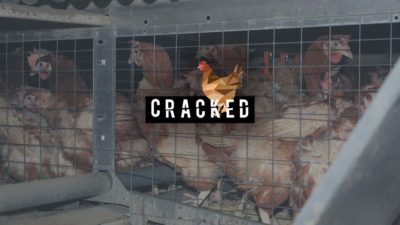Meat Kills

Meat has been recognised as a risk factor for cancer since the early 1900s. Countries with high intakes have higher rates of bowel, breast and prostate cancer, three of the most common types. Other studies show that people who eat the most meat have a higher risk of bowel, liver, lung and oesophageal cancer.
So what is it in meat that’s responsible? Well, it’s hard to say as there are so many candidates to choose from: saturated fat, animal protein, haem iron, salt, cancer-causing compounds called NOCs, HCAs and PAHs… it’s an extensive list. Diets high in saturated fat, leading to obesity, increase the risk of breast, prostate and bowel cancer. Animal protein increases levels of a growth hormone called IGF-1, which increases the risk of bowel and lung cancer. IGF-1 levels are lower among vegans. Iron overload can increase cancer risk by generating cancer-causing free radicals.
NOCs (in preserved meat and produced in the gut from meat), bind to DNA and cause mutations that can lead to cancer. Cancer-causing HCAs and PAHs are produced by cooking meat at high temperatures, on a barbecue for example. All meats contain at least some of these so avoiding meat completely is the only effective way of reducing your risk of cancer.
Researchers from the University of Oxford, found that, compared to meat-eaters, cancer incidence is lower in fish-eaters and vegetarians but lower still in vegans; UK vegans have a 19 per cent lower risk than meat-eaters. Similar results were found in the US where vegans have a 16 per cent lower risk and vegan women have 34 per cent less female-specific cancers.
BOWEL CANCER
The link between meat and bowel cancer is well-established; it’s one of the best-known diseases associated with meat. Again, a number of meaty substances may be to blame: animal fat, animal protein, NOCs, HCAs and PAHs and haem iron. Take your pick!
People who eat 400g or more of meat a day can be exposed to as many NOCs as a smoker! So meat-eaters may need the same level of health advice as smokers, which is what then Shadow Secretary of State for Environment, Food and Rural Affairs, Kerry McCarthy suggested in 2015 in an interview for Viva!life magazine. The research supports her; better dietary advice could save lives. Bowel cancer is the leading cause of cancer death among non-smokers in affluent countries and its prevention should be a major goal for public health.
BREAST CANCER
Links between diet and breast cancer have been suspected for a long time. Wide geographical variation and migration studies show that genes are responsible for only 5-10 per cent of breast cancers. The vast majority are caused by diet and lifestyle factors. The US Nurses’ Health Study found that daily servings of meat increased the risk substantially – especially in women using oral contraceptives.
Girls exposed to radiation from the atomic bombs at Hiroshima and Nagasaki were more likely to get breast cancer later in life than those not exposed, but women over 40 who were exposed had no such increased risk. This inspired researchers to investigate the adolescent diets of women. They found that those who ate a lot of meat when they were young had a much higher risk of premenopausal breast cancer.
Several different substances in meat may be to blame, including animal fat, HCAs and PAHs, haem iron and hormone residues. Fruit, vegetables and fibre lower the risk. Given that breast cancer now affects one in eight women in the UK, the consumption of meat should be regarded as a public health concern. Dietary advice given at mammography screenings would be an effective way of helping women lower their risk.
PROSTATE CANCER
The high consumption of red, processed and well-done meat is linked to prostate cancer. It is suggested that an HCA called PhiP is responsible. Fried, roast and grilled chicken can contain particularly high amounts – chicken and PhiPs – not so finger-licking good after all!
The Prostate Cancer Lifestyle Trial found that men recently diagnosed with prostate cancer were able to avoid or delay treatment for at least two years by following a vegan diet. Despite this evidence, public health advice on the links between diet and prostate cancer is sparse.
LUNG CANCER
High intakes of meat and haem iron are linked to lung cancer, one of the most common and serious types of cancer. In 2007, the World Cancer Research Fund (WCRF) said that red and processed meats might be a cause. The huge NIH-AARP Diet and Health Study from the US was in no doubt – they said meat is linked to lung cancer and cancers of the bowel, liver and oesophagus. They said one in ten lung and bowel cancers could be avoided if people reduced their meat intake. Avoiding it altogether would be even more effective. Suspected culprits include heavy metals, synthetic hormones, NOCs, HCAs and PAHs, haem iron and animal protein which increases IGF-1. High intakes of vegetables, fruit and soya reduce the risk of lung cancer.
KIDNEY CANCER
Studies show that cancer-causing HCAs and PAHs in cooked meat are also linked to kidney cancer. One theory is that they activate enzymes (proteins that accelerate chemical reactions in the body) making them behave differently, causing mutations in DNA that can lead to cancer.
PANCREATIC CANCER
Meat is linked to pancreatic cancer, the fourth most common cause of cancer death worldwide. Animal fat, HCAs, PAHs and haem iron are thought to be involved. Vegans have a much lower risk of this disease than meat-eaters. The huge European-wide EPIC study found strong links with chicken and suggested that antibiotics and/or drugs called coccidiostats given to poultry and cattle to prevent the growth of parasites may be responsible. They also said that viruses in undercooked meat may be involved. So you are damned if you cook it, and damned if you don’t!
STOMACH CANCER
The links between processed meat and stomach cancer, the fifth most common cancer worldwide, have been known about for over a decade. The WHO has reported links between processed meat and stomach cancer. The WCRF agree. They also say that grilled and barbecued meat, and eating little or no fruit, increases the risk.
High levels of salt, nitrite, nitrate and NOCs in processed meats have been blamed along with cancer-causing PAHs in smoked meat.
GO VEGAN!
The meat industry has been able to influence official dietary guidelines for too long. If the government aren’t brave enough to revise their advice then hopefully people will make the change for themselves.
Going into old age disease-free, fit and healthy is all any of us could hope for. If one simple lifestyle change can help achieve that, isn’t it worth encouraging everyone to make the change today?
Based on the Viva! Health report: Meat the Truth – how and why meat consumption is a major public health concern. A review of the evidence. Available at www.vivashop.org.uk




